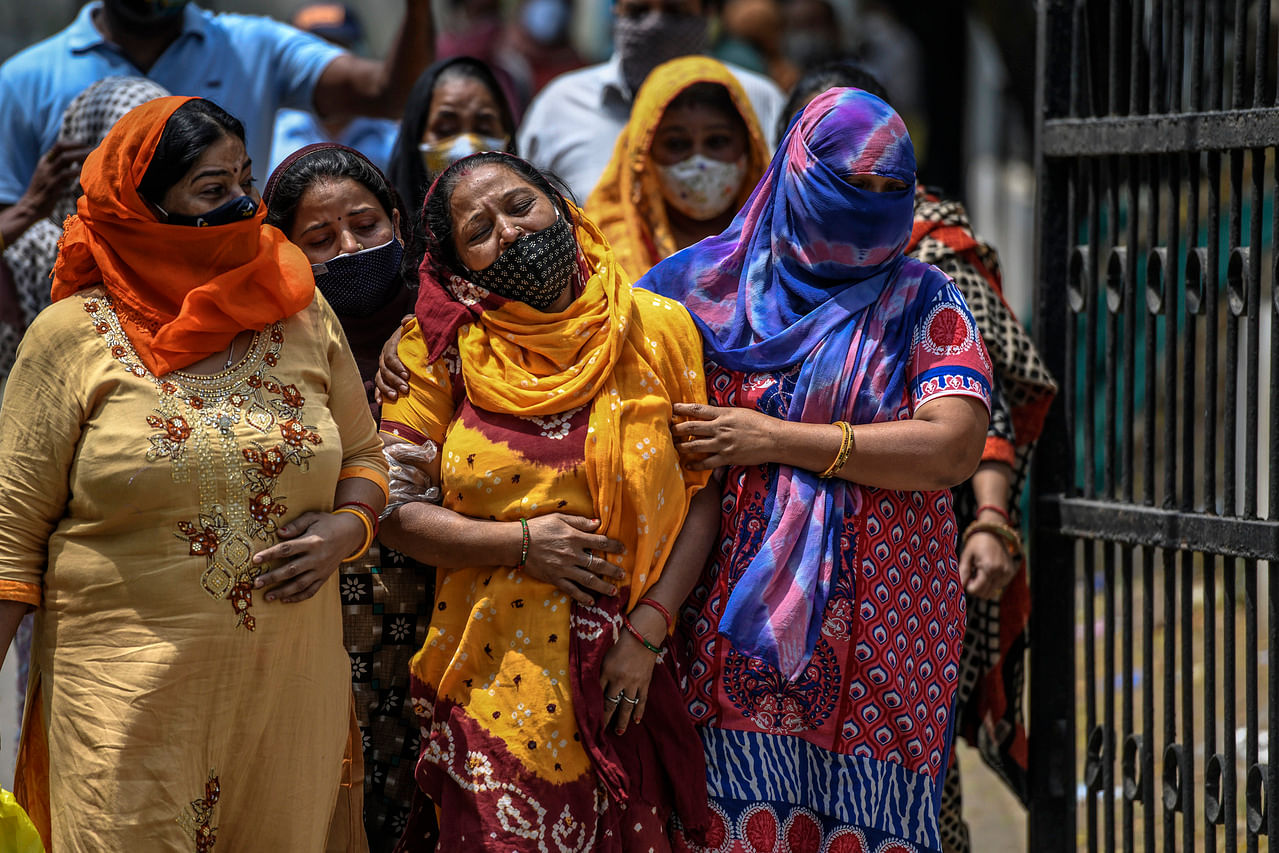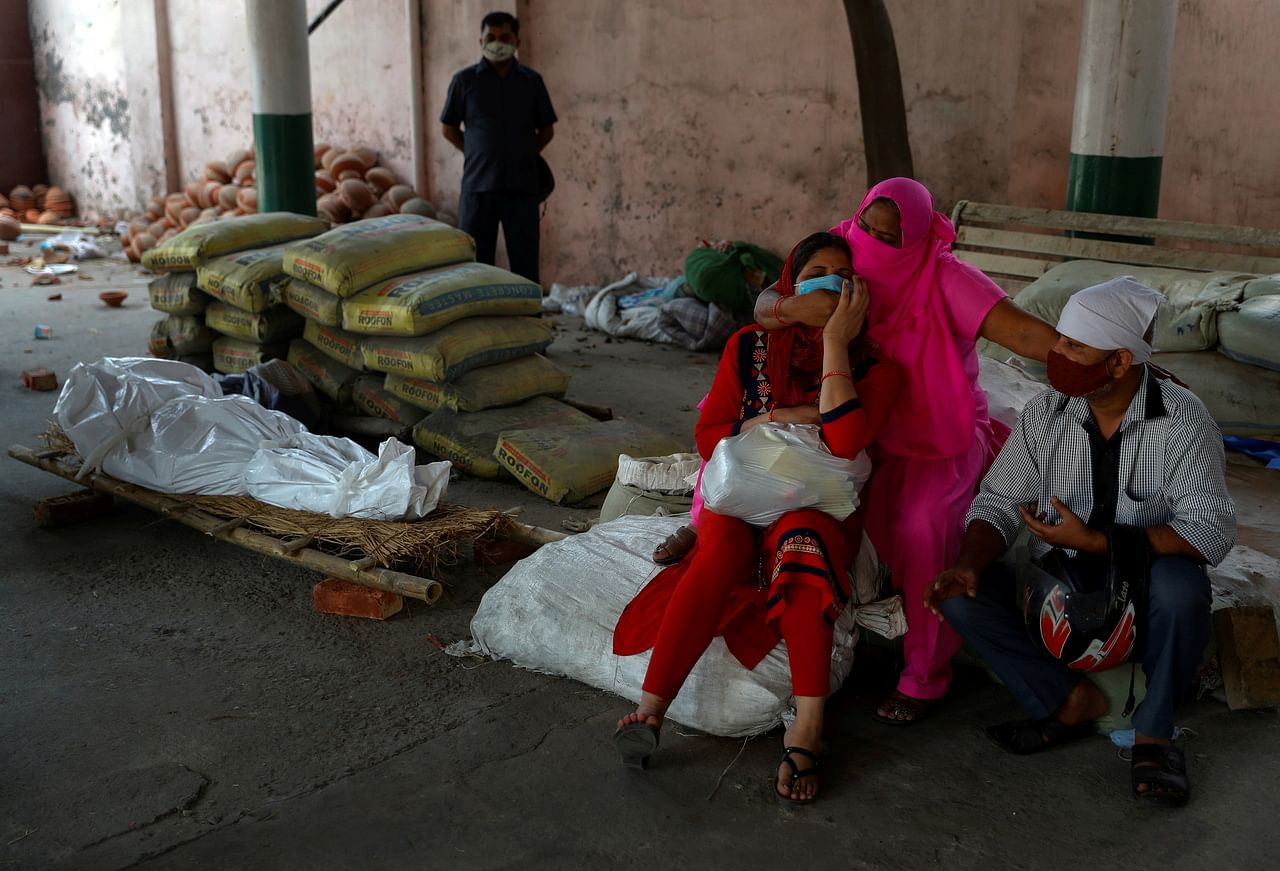Anguish, anger in India with lives lost to Covid-19 due to lack of medical help

NEW DELHI - Mrs Yamini Amrohi held her husband in her arms as he slipped away in their car outside the gate of a hospital in Gurugram, Delhi's satellite city.
She and her son had rushed Mr Ashok Amrohi, 65, to the hospital on the night of April 27 after his condition deteriorated at home and his breathing became laboured.
They got there at 7pm but the admission formalities, including a Covid-19 test, took five hours, by which time it was too late for the former diplomat, who had once been ambassador to Brunei, Mozambique and Algeria.
"He (my son) told me that there was a long queue (of other patients) inside the hospital. I ran inside two to three times shouting, 'Please, somebody should see him. He is getting short of breath'."
At one point, Mr Amrohi threw off the oxygen mask even as his wife kept trying to put it back.
"My son came and he kept saying 'papa please, stay strong, it's just a matter of 10 minutes (before they complete hospital formalities)'. But I knew he was gone."

A sense of anguish, hopelessness and anger has settled over India, which is going through a second wave that has devastated families and is overwhelming the health infrastructure around the country.
Normal life has come to a complete standstill. The mood is sombre all around with no one untouched by the crisis.
WhatsApp and social media, once a source of jokes and entertainment, have become a roll call of desperate pleas for help in getting hospital beds, oxygen and medicines.
Privilege and connections have proved of little help in this crisis as rich and poor have struggled alike to get basic medical help, and many lives are being lost because of delays in getting to it.
By Saturday afternoon, lawyer Srishti Khindariahad spent the last 30 hours calling hospitals in Delhi without success, looking for beds first for the grandmothers of her two best friends, and then her own aunt.
"It's a nightmare and heartbreaking," she said. "We've tried every single lead. No one answers and if they do, they refuse.
"Or most places are refusing to take critical patients because they don't have enough oxygen themselves and are asking to arrange for oxygen ourselves. Everyone I'm talking to, even if decently "connected" or with political influence is telling us to go out of Delhi."
Mumbai-based entrepreneur Vaibhav Sisinty has been desperately tracking the health of his grandfather, 86, and grandmother, 82.
He spent 15 hours on the phone looking for beds for his grandparents, who were 1,663 km away in the city of Bhubaneswar in Odisha state. They got into a hospital but the facilities were so poor that he is once again looking for another hospital.
"My grandfather's condition is bad. I am totally helpless. I am stuck in Mumbai. My brother in Dubai," he said.
"It's just horrible."

When the first wave peaked in September last year, India had a total of 97,000 reported cases of Covid-19. It has now set a daily new record with 401,993 cases in the 24 hours up to Saturday. The country has more than 18 million cases with the death toll now at 211,853.
The acute shortage has driven people to look for oxygen where they can .
On a road near Delhi, Mr Bhupender Jaiswal, 44, sat on the pavement last Wednesday, waiting for a close relative to be brought to a drive-in oxygen facility at a Sikh temple in Ghaziabad.
The Covid-19 patient had been discharged from a Delhi government hospital after showing some improvement but was not fully recovered. "They said to take him somewhere else. There is no bed here," said Mr Jaiswal. His relative's condition deteriorated overnight, forcing them to scramble anew for oxygen.
In another part of the city, lawyer Amit Sharma, desperate for a bed for his brother-in-law, petitioned the Delhi High Court on Tuesday.

But as the judges were hearing the case on Friday, he informed the court that his brother-in-law, Atul Kumar Sharma, had died. "My lord, my brother-in-law has expired. No more efforts should be made. I have completely failed. So grateful to you," Indian media reported him saying.
"No. The State has failed. We have failed. We all have failed," Justices Vipin Sanghi and Rekha Palli in the Delhi High Court replied.
India's Cabinet on Friday called the pandemic a "once-in-a-century" crisis.
Even those who have devoted themselves to helping others are finding themselves overwhelmed by requests.
Bollywood actor Sonu Sood shared a video of his phone beeping with English and Hindi messages every second from distressed people across India: "Pls find bed for my father, oxygen low", "No bed sir", "Want ambulance".
In another post he said it was taking him an average of 11 hours to find one hospital bed in Delhi and 9.5 hours in Mumbai.
Anger is also bubbling up against a system that has let people down. In at least two incidents, grieving relatives have attacked doctors or health workers.
In the meantime, cricket is often a balm for many Indians, but the hoopla of the biggest sporting event, the lucrative Indian Premier League, carrying on during the pandemic's second wave has been jarring for some.
When the IPL scheduled matches in Delhi last week, barely a few streets away from where the burning pyres of Covid-19 patients were visible, it triggered outrage.
Sports writer Sharda Ugra, who admits that she loves cricket as a game and a distraction, said it angered her that the "cricketing community has made no mention of this escalating crisis, death and misery", and top cricketers had donated little to efforts to help patients.





No comments
Share your thoughts! Tell us your name and class for a gift (: